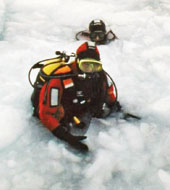 |
| Paul Rose goes ice diving in Antarctica |
Following reports that the IPCC (Intergovernmental Panel on Climate Change) might not have been accurate in its prediction about glaciers melting in the Himalayas, the basic assumptions of climate change theory have been seriously questioned.
But Paul Rose, internationally renowned adventurer and polar explorer, will have none of it. He has seen it happening at the south and north poles, the areas where the climate change is at its most noticeable. Rose has visited the poles 21 times in the last two decades and has been involved in scientific studies of the poles.
“I first went to the Antarctic in 1992. Since then I have visited the North Pole nine times and the South Pole 12 times, and I have no doubt that the world is warming up and nowhere is it more apparent than the poles,” said Rose, recently in the city as part of British Council’s Low Carbon Futures programme on climate change.
“While in the Arctic the impact is more noticeable with almost a navigational channel having opened up for trans-Arctic shipping, even in the Antarctic the ice shelves are breaking up more frequently than before. One can feel it while diving under the ice,” said Rose.
The most recent visit to the Antarctic two months ago is linked to a study to trace trapped methane in the area and its relation to climate change over the period, especially during the glacial age 11,000 years ago.
Rose feels that the IPCC scientists have mishandled the data on the Himalayan blunder. He called it “inexcusable” and said that the fault has “opened up the door for climate sceptics”.
“But one should not decide on the basis of such solitary information; rather one should consider the entire gamut of information on climate change before forming any opinion and it is overwhelmingly in favour of climate change happening in the planet,” said Rose.
The controversy erupted when it was found out that the contention of the IPCC’s fourth assessment report, that the Himalayan glaciers are receding faster than in any other part of the world and are likely to disappear by 2035, wasn’t taken from a scientific journal, but from WWF, which was in turn based on a story by the British popular science magazine, New Scientist.
The “air” has become murkier with recent reports of manipulation of scientific data by the Global Climate Project, whose researchers concluded that climate change is happening faster than thought earlier.
But the “no climate change” theory has few takers, for so overwhelming is the evidence to the contrary, Rose said.
“With education, people will be more aware of the damage to the climate that they are causing. I’m optimistic about the future and feel that the next global leadership will come from countries like India,” said Rose.

